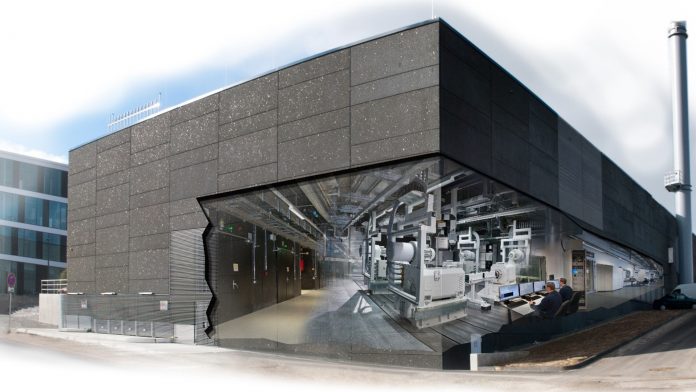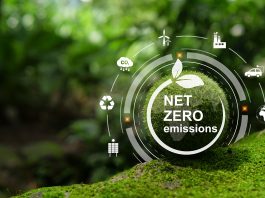Discover the Center for Sustainable Hydrogen Systems’ role in shaping a sustainable hydrogen future through education, global partnerships, and advanced infrastructure.
The hydrogen industry offers a unique doorway to a more sustainable future of energy generation. We asked RWTH Aachen University’s Center for Sustainable Hydrogen Systems about their work in developing hydrogen systems and its potential.
What is the primary mission and goal of the Center for Sustainable Hydrogen Systems at RWTH Aachen University, and how does it contribute to hydrogen research and innovation?
The materials and energy industries are largely based on carbon-based fossil resources. These have limited availability, and considerable greenhouse gas emissions can be released during energy and material use. RWTH Aachen University has declared sustainability a strategic topic. With the ‘Center for Sustainable Hydrogen Systems’ (CSHS) installation, RWTH has set the scientific course for an industrial and societal turnaround.
The activities of the centre are grounded on the foundation of infrastructure, on which the three main pillars of our work are built: The training of tomorrow’s specialists, innovation resulting from our research, and transfer to society and industry. Only with this holistic approach can we succeed in the following:
- Converting the energy and materials sectors to climate neutral operation;
- Reliably ensuring the supply and distribution of scarce resources as well as economic efficiency and environmental compatibility in handling; and
- Preserving natural resources as the basis of life for future generations.
The key to achieving these goals lies in hydrogen, a carbon-free energy carrier poised to bridge the gap between renewable electricity and chemical energy carriers and feedstock. This sector coupling is crucial for curbing CO2 emissions, demanding large-scale implementation in a rapidly expanding global ecosystem. The CSHS acts as a catalyst, fostering synergies to expedite progress beyond individual capacities. Our unique approach combines cutting-edge scientific research on vital aspects of a hydrogen economy with a holistic, sociological transformation toward a sustainable hydrogen society. This distinctive strategy is embodied in our collaborative Hydrogen Clusters4Future initiative, ‘Zukunftscluster Wasserstoff’. In this cluster, joint projects facilitate dialogue among research, industry, and society.
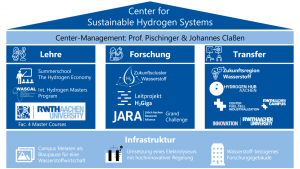
Can you provide examples of research initiatives at the CSHS, including hydrogen production and renewable energy integration projects?
RWTH Aachen University boasts a robust internal network of over 50 actively engaged chairs. This extensive expertise is evident in our involvement in over 100 national and international projects, covering the entire hydrogen ecosystem. Notable initiatives include the H2Giga hydrogen flagship project, where over 120 partners collaborate to bring efficient electrolysis technologies into series production, aiming for a rapid ramp-up of hydrogen production. The CSHS contributes to this goal with the upcoming commissioning of a 0.5 MW electrolyser and plans for additional units to cover hydrogen consumption and advance future technologies.
The centre, as well as the aforementioned Hydrogen Clusters4Future, provides the necessary interdisciplinary and diverse networks to navigate the intricate system complexity inherent in hydrogen development. Our role involves identifying bottlenecks, conducting interdisciplinary research, developing innovations, and fostering cross-ecosystem knowledge exchange. This commitment is embedded in our culture of open innovation.
The CSHS has proudly joined forces with the Women in Green Hydrogen initiative, contributing to specific goals or activities, with a dedicated focus on promoting gender inclusivity and equality in the field, as we believe in the importance of fostering a diverse and inclusive environment for all.
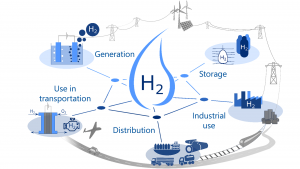
The CSHS also plays a key role in promoting international developments in hydrogen. One example is our partnership with the WASCAL project, which focuses on building green hydrogen production capacity and training local professionals in West Africa. Our research into using hydrogen as a feedstock for producing green chemicals and eFuels is to be continued through our participation in the German Cluster of Excellence Fuel Science Center (FSC).
How does the centre collaborate with other institutions, and what areas along the hydrogen value chain does it focus on?
Our research portfolio is broad. The best example is our cluster, which examines all aspects of the hydrogen value chain. From production (for example, by electrolysis) to storage (for example, in the development of pressure vessels), transport in pipelines or the existing gas network, which is enabled by applying an appropriate coating, use for the production of chemicals, for heating or mobility applications.
Within the microcosm of RWTH Aachen University, the CSHS networks all the players in these disciplines and thus keeps an eye on the big picture on the way to a sustainable hydrogen society. Providing and sharing the necessary research infrastructure is also an important topic. For example, the close connection to our Center for Mobile Propulsion (CMP) should be mentioned here. We have already implemented a comprehensive hydrogen infrastructure in this state-of-the-art test centre with 13 flexible test benches for testing fuel cells, combustion engines, and entire powertrains. Tests with ammonia as an energy carrier are also possible here. Beyond the borders of RWTH Aachen University, we are actively involved in numerous international projects and research networks, such as Hydrogen Europe Research.
Exchange is important for innovation – nationally and internationally – and between stakeholders in research, industry, and politics. To this end, we have initiated the ‘Aachen Hydrogen Colloquium’ conference within our Hydrogen Clusters4Future, which will take place for the third time next year on 14-15 May, 2024.
What educational programmes and initiatives are offered by the CSHS to promote hydrogen technology expertise among students?
Education plays a vital role at CSHS, strongly emphasising nurturing young talent. To highlight just a selection of the initiatives already carried out, I would like to point out a few course offerings from the current year:
We host an annual summer school focused on hydrogen, providing students comprehensive insights into the technology and its practical applications. In the spirit of European and international exchange, the CSHS organised a stop for the DAAD Green Hydrogen Research Tour in September 2023. We co-operate with the University of Namibia, UNAM, where we offer lectures. Another highlight was the Humboldtn summer school ‘Hydrogen Innovation Ecosystem,’ which brought us back to the overarching topic of sustainability. Here, the participating doctoral students and post-docs examined the impact of the growing hydrogen ecosystem on implementing the United Nations Sustainable Development Goals (SDGs). We are involved in the H2 Kickstarter programme HySchool of the Open Grid Europe (OGE) and RWTH business school, have launched various project modules, and show our students existing course offerings in hydrogen. To provide students with hands-on engineering experience, CSHS actively supports student initiatives like Ecogenium. Since 2020, this initiative has been working on the construction of one-person fuel cell racing cars. These practical experiences are invaluable for students, offering real-world applications of their theoretical knowledge. In line with our commitment to fostering expertise in hydrogen technology, we are developing a master’s programme dedicated to training the next generation of hydrogen experts at RWTH Aachen University.
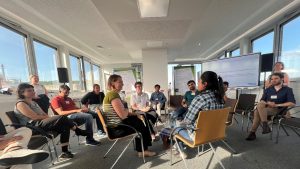
What is the global impact of the centre, and what international collaborations and projects are highlighted?
The global impact of the CSHS is substantial, driven by international collaborations and projects. At the European level, we actively engage in several projects like, CoacHyfied, HyInHeat, HYSCORE or DECODE and contribute to calls and hydrogen roadmaps through our membership in the Hydrogen Europe research network. This involvement allows us to actively shape the future of the hydrogen economy on a continental scale. Our exchange with the Asian economic region exemplarily takes place through co-operation and common events like the Tokyo Tech Workshops, enabling us to share knowledge and insights with key players in the Asian hydrogen landscape.
In African terms, CSHS has embarked on the WASCAL (West African Science Service Centre on Climate Change and Adapted Land Use) project. This initiative involves forging partnerships in West Africa to develop green hydrogen production capacities and to provide training for local specialists. Our collaboration with the University of Namibia is another pivotal step in expanding our global reach. This collaboration, which includes mutual visits, personnel exchanges, and the development of a joint lab on green hydrogen, highlights our commitment to making a global impact and extending our research activities beyond our Aachen location.
What are the major challenges and prospects for the CSHS in scaling up green hydrogen production?
The major challenge facing green hydrogen as a climate-friendly energy carrier in industry and mobility is the need to make it available in sufficient quantities. Scaling up production capacities is a focal point for the CSHS. We are actively involved in constructing and operating an electrolysis plant demonstrating the successful implementation of production plants on an industrial scale.
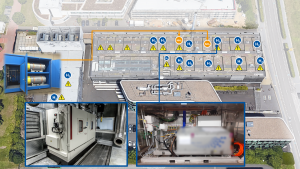
Left: Image of Climate Chamber. Right: Image depicting a Fuel Cell System tested in the Climate Chamber
To achieve this, we work on integrating renewable energy sources and developing efficient electrolysis technologies. Addressing the challenge of structural changes, such as the transition away from brown coal in North Rhine Westfalia (NRW), is part of our remit. As CSHS continues to drive research and address these challenges, we are committed to advancing the availability and viability of green hydrogen on a larger scale.
Could you explain the infrastructure and facilities available for industrial-scale hydrogen and ammonia technologies?
The Center for Sustainable Hydrogen Systems (CSHS) is actively expanding its infrastructure and facilities to support the development of industrial-scale hydrogen and ammonia technologies.
As mentioned, our scientific expertise covers the entire spectrum of the hydrogen value chain. In each area, we conduct research ranging from low TRLs in fundamental research to application-oriented technologies shortly before series production. In hydrogen generation, i.e., electrolysis, some laboratories deal with catalysts or membrane technology. At the same time, we are looking at processes for the rapid ramping-up of production. In storage, we have entire manufacturing sites for fibre-reinforced pressure vessels. We have additive manufacturing systems such as 3D printing, which in future will be used to coat the inside of existing pipelines using build-up welding, for example. We create burners for home heating and industrial applications, conduct material tests in pressurised hydrogen atmospheres, and much more. One example of infrastructure in the mobility sector is the CMP mentioned above. Here we have many state-of-the-art system test benches for hydrogen system applications, from the engine to the fuel cell to the entire powertrain, but also for single-cell and stack tests. For example, in the X-EMU project, we set up a fuel cell system and a high-voltage battery in two test benches and interconnected them within a real-time network. In combination with other virtually integrated components, the entire powertrain could be simulated. We have optimised the system’s operation strategy by emulating representative application or load scenarios for a train in German regional transport. With minimised degradation, we could operate the fuel cell almost permanently at the optimum operating point.
There is even a hydrogen-capable roller test bench and a test track for entire vehicles. In addition to hydrogen, we are exploring the potential of ammonia for heavy-duty applications, such as aviation and maritime. This exploration involves using solid oxide fuel cells to assess the feasibility and efficiency of ammonia-based systems. Our ongoing research aims to provide sustainable alternatives and innovative solutions for various industrial and transportation applications.
How does the Center for Sustainable Hydrogen Systems partner with industry, and what advantages does this offer to the centre and young scientists at RWTH Aachen University?
Collaboration with industry is pivotal at CSHS and a cornerstone of our research endeavours. This close partnership facilitates the seamless transfer of innovation, with industry partners actively engaged in projects, jointly developing key technologies for real-world applications. Numerous research projects with industrial partners thrive within our dynamic environment, including the Hydrogen Clusters4Future, solidifying CSHS as a flagship for hydrogen innovations. This collaboration’s exchange of personnel and knowledge creates a powerful multiplier effect.
This setup ensures our work directly tackles current industry challenges, providing access to cutting-edge research findings. Our partnerships act as a bridge connecting theory, practice, and industrial application. This collaboration, particularly with industry partners, offers young scientists at RWTH Aachen University an education at the forefront of the field, enriching their professional development with real-world experience. This symbiotic relationship enables us to address industry-specific issues while offering students opportunities to engage with the latest advancements in hydrogen technology. The H2UB start-up hub in our network fosters start-ups and spin-offs in various hydrogen domains.
QuinCAT, an European Regional Development Fund (ERDF) incubator at RWTH Aachen University, provides 15 accessible laboratory spaces for start-ups in ‘Green Chemistry & Engineering.’ Additionally, our collaboration platform, ‘Ausgründungspotenziale Nachhaltige Chemie’ (KOALA), with the Max Planck Institute for Chemical Energy Conversion, is funded by the Ministry of Culture and Science of NRW. This unique setup consolidates technical expertise and implementation experience across the hydrogen economy. Developed within our cluster, this approach ensures the seamless transfer of challenges and solutions between individual aspects and the system perspective. As a result, CSHS becomes a service provider and innovation nucleus, facilitating the integration of scientific knowledge, teaching, societal needs, and economic implementation.

Please note, this article will also appear in the sixteenth edition of our quarterly publication.

